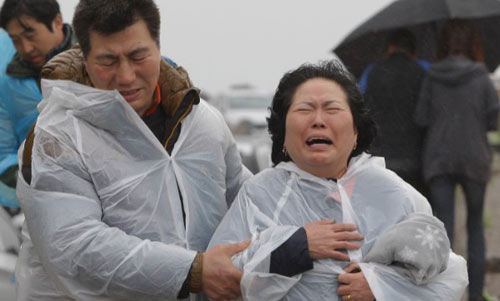|
查看原文
Twenty parents of missing high school students gathered behind a television truck Sunday afternoon and talked about a subject that, for days, they hadn’t been willing to broach.
“Realistically,” one parent told the group, “we need to acknowledge that we have no hope of finding our children alive.”
Nobody disagreed.
Instead, they discussed the logistics of recovery, of finding a way to pull their teenage children from the water as quickly as possible. That, they agreed, should be the new focus of a government search unfolding about 10 miles off the coast.
The parents took turns talking. There were bags under their eyes. Their voices never rose. A few puffed cigarettes. They’d been asked by the South Korean coast guard to offer opinions about the next stage of the search, and here they discussed in detail ways to lift the submerged ferry out of the Yellow Sea, if only as a way to end an impossibly bleak wait.
“People have lost hope very quickly,” Yoo Kyeong-geun, the father of an 11th-grader on the ferry, said after the meeting. “Until yesterday, nobody could even talk about dragging the ship out of the water” — a jarring step that would endanger any survivors—“but now a lot of people say it. It’s just so we can see our kids’ faces one last time before their bodies become more damaged underwater.”
After the ferry with 476 people aboard capsized Wednesday, relatives who rushed to this rural port town — a staging area for the recovery effort — were frantic, so furious about the pace of the rescue operation that they doused the prime minister with water. By Sunday, those relatives had grown hushed, and at Jindo’s port, bodies were brought to shore in twos and threes.
The Sewol had been sailing from Incheon to Jeju when it tilted and sank off the southwestern coast of the Korean Peninsula. So far, 174 passengers have been rescued — all in the first few hours of the disaster. South Korean officials on Sunday released an extended transcript of communication between the stricken vessel and maritime operators, shedding light on some of the confusion aboard before the ship lost contact.
Within 19 minutes of placing a distress call, a Sewol crew member said three times, when asked about passengers aboard, that it was difficult to move around the dramatically tilted vessel.
“The ship is tipped over too much,” the crew member said at one point. “It’s impossible to evacuate.”
Some survivors say an evacuation order was never given, and those who heeded crew advice to stay in place were most likely trapped aboard after the ferry overturned.
The relatives of those who didn’t make it out are now waiting. Some loved ones of the 244 still missing are camped out at a gymnasium 30 minutes away. But many spend their days at the port, where a tent city with volunteers, free food and cots has sprouted. The tents span a quarter-mile — the Red Cross here, mobile food trucks there. Another tent has only a whiteboard, labeled at the top “List of Names.” Dozens of people at a time stand around the list of victims, photographing it, staring at it, sometimes sniffling.
When bodies are found offshore by divers, an official walks over to the list with a pen. On Sunday, the list began with 36 names. By sunset, there were 58. Some had been identified by their height and appearance, others not at all. No. 48 was Guk Seung-hyeon, one of the 325 high school students heading on a four-day trip. No. 49 was a man, 5-foot-7, wearing blue jeans and a sweatshirt.
In the first four days of the search, bodies were found slowly, only when currents washed them out of the ferry and into the Yellow Sea. But late Saturday, divers had punctured a hole in the vessel, opening up the first passageway to some of the chambers. After that, police vessels began pulling up to Jindo’s port every hour or two with bodies.
No. 50 arrived at 2:10 p.m., along with Nos. 51 and 52, sending many of the relatives in the tent city scrambling to the docks. Dozens of police officers stood at attention in rows, and six officers carried each of the covered bodies toward yet another tent, marked “Identification.” An official gathered relatives of the missing and described some of the identifying characteristics of the latest three found dead. New Balance sneakers. Track pants. Most heard the description and walked away.
Several hours later, Yoo and the other parents were discussing ways to speed up the search. They talked about stationing a barge in the area that divers could use to rest and to put on equipment. They also talked about hoisting the ship from the sea floor—a process that will require several massive marine cranes and a floating dock.
“Do you even know how long it takes to pull a ship out of the water?” one father said. “I’ve heard 20 days.”
Yoo said that depending strictly on divers seemed to him a method “30 or 40 years old.”
Yoo’s daughter, Yoo Ye-eun, attended Danwon High School in Ansan, a city just south of Seoul.
“I’ll stay here until it’s all over,” Yoo said. “Until I leave here with my daughter.”
|
查看譯文
4月20日下午��,二十位韓國失蹤高中生的家長聚集在一起����,一位家長告訴其他家長說��,“事實(shí)上���,我們得承認(rèn)我們的孩子活著回來是沒有希望了����?����!?/p>
沒有人對(duì)此提出異議�。
相反,他們討論搜尋尸體和盡快從海里撈出孩子的工作�����。他們認(rèn)為這些才應(yīng)該是政府在離岸十英里范圍內(nèi)開展的搜救工作的新焦點(diǎn)。
家長輪番講話��。明顯的眼袋和低沉的說話聲透漏出失望的心境���。有些人苦悶地吸著煙��。韓國海岸警衛(wèi)隊(duì)員請(qǐng)求這些家長對(duì)下一步搜救計(jì)劃提出建議����,而現(xiàn)在他們正詳細(xì)地討論如何把在黃海淹沒的渡船拉出來���,如果這一方法真的能結(jié)束這毫無希望的等待�。
一位在遇難渡船的高中二年級(jí)學(xué)生父親劉京根會(huì)議后說道����,“人們很快就失去了希望��。昨天為止����,還沒有人能夠談?wù)摪演喆铣鏊氖虑椤@一舉動(dòng)會(huì)危及幸存者——但現(xiàn)在大部分人都同意了。因?yàn)槿藗兿朐谑w浸泡腐爛之前最后一次見一見孩子?!?/p>
4月16日,載有476人的客船傾覆后�����,急忙趕赴到這個(gè)海港小鎮(zhèn)——進(jìn)行搜救工作的集結(jié)待命區(qū)——親屬們無法鎮(zhèn)靜�,并且對(duì)搜救工作的速度和進(jìn)程感到非常憤怒,最終甚至往總理身上潑水����。4月20日,親屬們漸漸鎮(zhèn)定下來���,同時(shí)在珍島港也可以看見偶爾三兩具尸體被拖出海岸�。
“歲月”號(hào)客船在從仁川開往濟(jì)州島的途中傾斜�、沉陷于朝鮮半島的西南海岸處。到目前為止�����,174名乘客得救——都是在事故發(fā)生后的幾個(gè)小時(shí)內(nèi)得救的�����。韓國官員在4月20日公布了遇難客船與海上指揮官之間的通信記錄,揭露了客船失聯(lián)前的一些謎團(tuán)��。
在發(fā)出求救信號(hào)的19分鐘內(nèi)�,當(dāng)歲月號(hào)船上工作人員被問及乘客情況時(shí)重復(fù)三次地說,在如此劇烈傾斜的客船里走動(dòng)是非常困難的��。
該船員說道:“船只傾斜得很厲害�,疏散工作根本無法進(jìn)行?�!?/p>
一些幸存者說他們沒有聽到任何疏散撤離的指令���,并且那些聽從船員原地不動(dòng)命令的人很可能在翻船后困在里面了�����。
沒逃出沉船的乘客家屬現(xiàn)在還在等待中�。244名遺失者的親人駐扎在離事發(fā)點(diǎn)30分鐘車程外的體育館內(nèi)�����。但許多人會(huì)在港口晝夜等待�,那里已經(jīng)形成了小型帳篷區(qū)����,給親人家屬提供志愿者服務(wù)���、免費(fèi)食物和床位。
當(dāng)潛水者把尸體拖到岸邊時(shí)����,一名官員會(huì)拿著筆和名單走過去。4月20日����,名單里只有36個(gè)名字。到日落時(shí)��,就達(dá)到了58個(gè)�。有些人憑身高和長相就被認(rèn)出了身份,但其他人根本無法認(rèn)出來��。48號(hào)是郭圣賢��,是前往四日游旅行的325名高中生之一���。49號(hào)是一名男性�����,一米七左右���,穿著藍(lán)色牛仔褲和運(yùn)動(dòng)衫��。
搜救前四天內(nèi)�,找到尸體的速度很慢�����,只有強(qiáng)勁的海流把尸體沖出船只�,漂到黃海時(shí)才能找到。但上周六晚些時(shí)候����,潛水者們?cè)诖w上戳出了一個(gè)洞,打開了首個(gè)通往一些房間的過道��。之后���,警船開始每一到兩個(gè)小時(shí)內(nèi)往珍島港拖運(yùn)出尸體����。
50號(hào)尸體是在下午2:10抵達(dá)岸邊的���,同時(shí)還有51號(hào)和52號(hào)��。這使許多在帳篷區(qū)的親人們慌亂沖向碼頭��。十多名警官站成一排�����,保持秩序����,而六名警官各自搬出一具被白布蓋住的尸體�,前往另一個(gè)標(biāo)有“指認(rèn)”的帳篷。一名官員聚集了遺失乘客的家屬�,并描述最新三具尸體的一些身份特征。新百倫運(yùn)動(dòng)鞋�。長運(yùn)動(dòng)褲。大部分人聽完描述后紛紛離開����。
幾個(gè)小時(shí)后,劉京根和其他家長正討論加快搜救工作的方法����。他們談到要在搜救區(qū)域放入一艘駁船��,以便潛水者休息和存放隨身設(shè)備���。他們還談到要把船吊出海平面,而這一方法需要投入好幾架大型海上起重機(jī)和一個(gè)浮動(dòng)船塢���。
一位父親說道�,“你知道把一艘船拖出水要花多長時(shí)間嗎���?我聽說要20年�����?����!?/p>
劉京根說完全依靠潛水者來進(jìn)行搜救工作對(duì)他而言像是“30或40年前的方法”�����。
劉京根的女兒劉藝恩就讀于安山的檀園高中��,位于首爾市南部�。
劉京根說:“我要呆在這里,直到這一切都結(jié)束為止��,直到我?guī)е遗畠弘x開����?!?/p>
(譯者 李妍慧 編輯 丹妮)
掃一掃,關(guān)注微博微信
 
|


